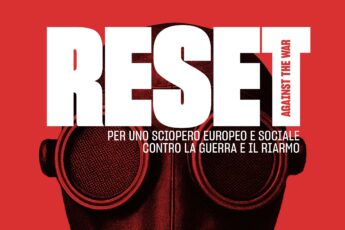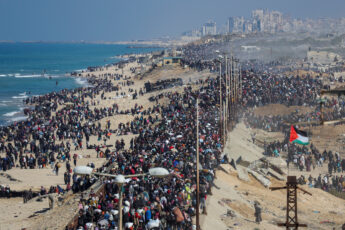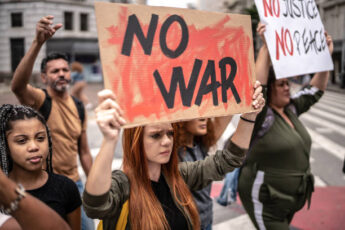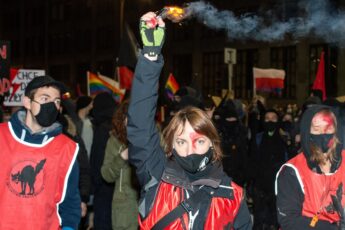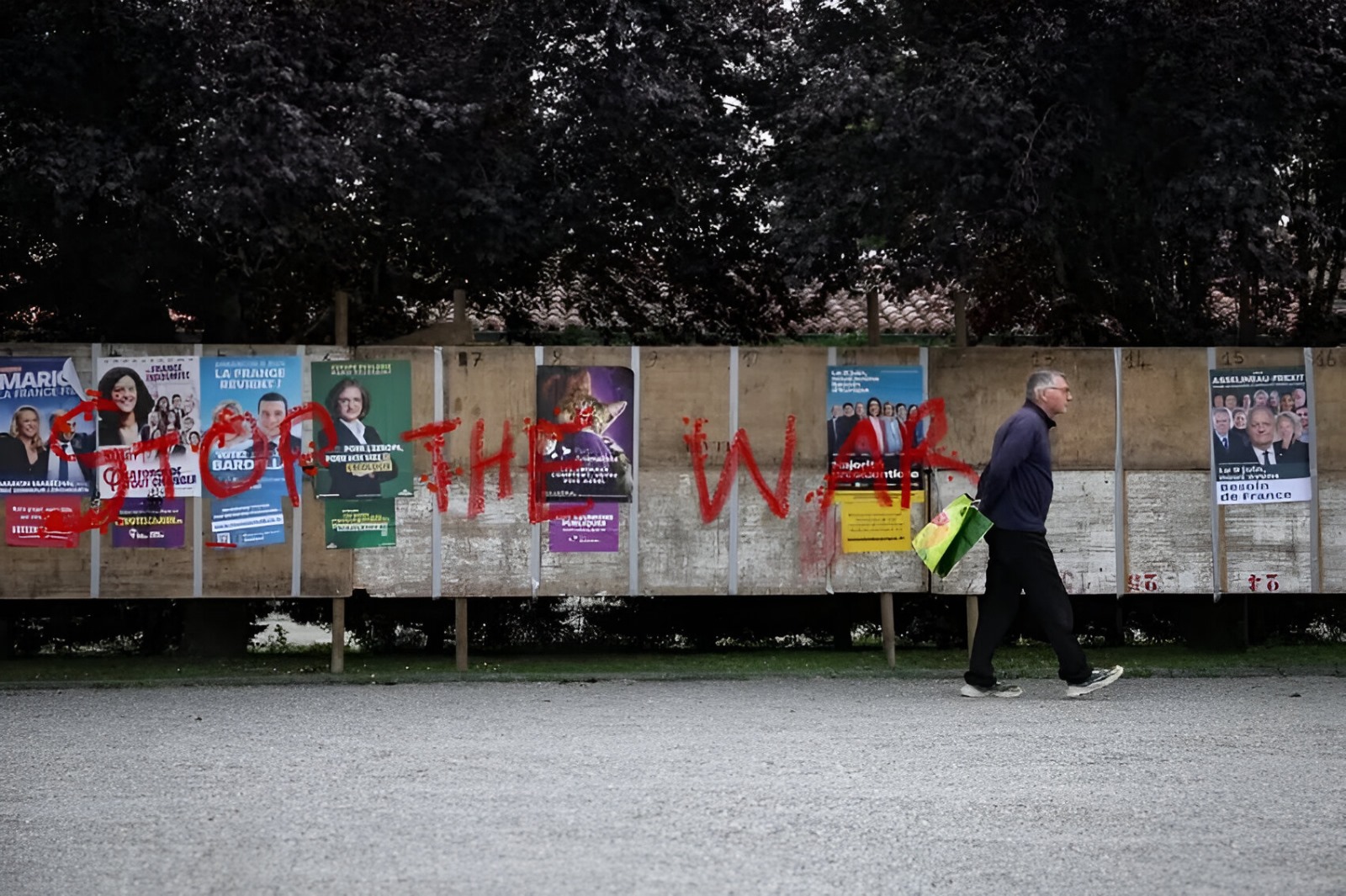
by PERMANENT ASSEMBLY AGAINST THE WAR
Europe is at war. European countries have been involved in numerous conflicts in the past and are embroiled in NATO politics. There is a concrete risk of escalation and open conflict with Russia at any time. But we should not underestimate the shift we are witnessing today: the EU and European states are engaged through weapons delivery and military to Ukraine and in supporting Israel in carrying out the genocide in Gaza and are now pushing to extend further the reach of European armaments used to repel Russian invasion. Besides this active role in fueling wars at the edge of the EU, dramatic shifts are underway inside, and a military turn is reshaping it at all levels, with societal effects that go well beyond its institutional borders.
We need to get used to a new era, that of a ‘pre-war’ instead of a ‘post-war,’ they say. European politicians seem to agree on the fact that the war is an inescapable horizon and that sacrifices – economic, social, human – are necessary. And even those who declare that they want to secure peace, are fostering further militarization and nationalism. This narrative deepens and accelerates already existing tendencies: we see programs that bring the military culture closer to children at school; ads campaigns to make joining the army attractive, clean, and gender-equality driven; the alignment of universities and armies in research; discussions on the reintroduction of military conscription where it had been long suspended or abolished; inventories of anti-bomb shelters. In this way, militarism becomes today’s “there is no alternative” updated to the Europe at war.
This does not mean that we have in front of us a homogenous scenario, and it makes a difference whether one lives in the EU or not. In Greece, militarization has been around since the dictatorship, fuelled by the constant threat of a new war with Turkey and even during the financial crisis and austerity policies a massive amount of public spending went to the military sector, and there was mandatory military service of a minimum of 12 months. The current transformations are, therefore, not a complete novelty but a deepening of an existing reality: more investments are now spent on high-tech warfare, moulded on the model of the Israeli army, for the benefit of ruling classes, while migrants are treated as “enemies of the nation”. In Romania, as in other Central and Eastern European countries, militarism becomes the source of investments for transnational companies that take advantage of the low salaries and an opportunity to gain a bigger role in the military-industrial complex of the EU. The economy is being restructured in the long term to turn the country into a military outpost to provide resources and labour force for NATO activities. The EU expansion via the integration of further East European countries is sought by ensuring that Romania is a large military base for the war to come. Closer to the Ukrainian battlefield, as in Poland, talks of introducing obligatory conscription again and organizing a direct intervention in the war are becoming louder and louder,together with plans to fortify the Eastern border.
The turn towards war is also reshaping the relationships between the EU and neighbouring countries. In Turkey Erdogan is using the global legitimation of militarism to attack Kurdish people and political opponents. In the UK massive investments on the army go hand in hand with a militarization of the borders against migrants to fulfil the promise of Brexit
Despite differences, however, there are common tendencies that tell of a Third World War scenario. The war has become the pretext for erasing measures taken during and immediately after the pandemic crisis to support wages and incomes, and to divert public spending from healthcare, education, welfare to the military. Essential labour that had gained a political centrality during the pandemic is now turned into cheap and disposable labour for a death machine in the making. The generalized cuts on welfare and privatization for the sake of the military imply also a strengthening of the family as the centre of a privatized social reproduction, paid exclusively by workers’ wages and through women’s labour – for free or as migrant domestic workers. The shift to militarism is connected to the reassertion of sexual hierarchies and sexual discipline.
Moreover, in Europe industrial policies are making the coordinated production of weapons a political program. Going hand in hand with the call to sacrifice, this will impact the labour conditions of millions of people, pushing down wages and strengthening wage differential and hierarchies across European regions. But investments in the military are reshaping capital’s movements transnationally. Not only investments in weapons and related technologies, but also the prospect of destruction is tempting for capital’s speculations on future reconstruction in Ukraine and in Gaza as well. Where we see death, destruction, and genocide, they see opportunities for business.
The same applies to the climate crisis. No one believed that the promised green transition could solve it. Green labels have been used to justify more capital accumulation and investment in polluting resources, but now it is clear that green policies have been through and through reframed according to military priorities, as long as they are ‘strategic’ to ensure national and EU position in the transnational capital’s competition.
In the context of an already deep interlacement between universities, industry, and the military, we see now the EU actively fostering dual-use research and circumventing civil clauses for research. All research is bending towards security policies required by the war that would restrict researchers’ mobility and exchanges to safeguard national interests. The continuation of business-as-usual hides the normalization of the enlistment of all institutions for war policies. Militarism as an ideology is at play in reinforcing social and political institutions, from the family to the States, to internal and external borders, by emphasizing the need of hierarchies, discipline, and centralized authorities that enforce the grip of the capitalist-neoliberal, racist and patriarchal program. Countries preparing for war need money, need women ready to reproduce the labour force of the nation, and disciplined students at schools and universities, and we see with little exceptions that students are beaten up and repressed when they speak up against privatization and against the massacres in Gaza.
Within this context, it is important to acknowledge that the present shift has been anticipated by the long-lasting war against migrants. Border policies have long been a laboratory for militarization and repression. But the turn towards militarism is now contributing to sell institutional racism as necessary to secure borders against “hybrid threats”. A harshening of migration policies is under way, leading to the strengthening of migrants’ exploitation, detention and pushbacks. The EU pact on migration and asylum the UK signing the infamous Rwanda Bill, the Italian deal with Albania, the continuation of deadly policies in the Mediterranean sea, all speak of a new wave of externalization of European security policies that is having huge impacts well beyond its borders.
In front of this it is more urgent than ever to engage in thinking together what it is to be done to break the cage that is being welded around us. As Transnational Social Strike and Permanent Assembly Against the War, we have built an initiative that has represented, despite limits and difficulties, a point of reference for many who identify the war as a spiral of death, exploitation, racism, and patriarchy. We have taken a side against the war, not within the war, by refusing to be absorbed by the logic that the war reproduces. In this direction, we have circulated news, built bridges and facilitated political communication between those refusing the war in Ukraine and Russia and protesters in European and American universities; we have given resonance to the strike against genocide in West Bank; we have gathered Israeli voices against the war; we have supported encampments and joined demonstrations against Israeli’s murderous policy; we built coordination and gave visibility to the ongoing movements of migrants overwhelming borders and struggling against racism. For more than two years, as TSS and PAAW, we have been committed to build a transnational politics of peace that can only emerge from these concrete moments of communication and struggle.
We have experienced generally an enormous difficulty in our organizations to overcome the current deadlocks and build a perspective that does not end up caught in geopolitical traps. We have seen nationalism and racism being reproduced in social movements identifying for instance all Jews with the murderous politics of the Israeli government, all those who protested against genocide in Gaza as “antisemites”, or in pinpointing opponents to the investments for the military as Putin’s supporters. Unending fights have been dominated by the logic of friends and foes. To face Europe at war we need to overcome those traps and logics and look at the trends and fault lines and conflicts that define a shared anti-war program in spite of the national and local differences.
We see that amid Irsael’s assault on Gaza, the war between Russia and Ukraine is sometimes forgotten by movements. The fear for the possible enlargement is widespread, particularly among those who live in Eastern Europe, closer to the battlefield, and a feeling of inevitability seems to win over the drive to organize to change this situation. At the same time, we see that a growing number of Ukrainian men and workers, such as truck drivers, are refusing to enlist, challenging the prevailing narrative towards the war and has forcing the government to adopt a harsh law on conscription. At the same time, rage is fueling support for Palestine and against the genocide carried out by Israel in Gaza, with a contagion effect which swiped universities. Notwithstanding all contradictions, the widespread and variegated mobilizations claiming disclose and divest from the military economy open cracks in the logic of war.
These cracks need to be crossed and deepened, bringing to light the links between capitalism, war, militarism, and the material transformations in the living and working conditions of millions of people.Raising the voice against the war, foster transnational vision and communication, connecting struggles and subjects across the fronts, fighting against war and militarism is a fight for different conditions of social reproduction, against exploitation, patriarchy and racism, for better wages, a climate class conflict.
No updated internationalism can arise following old models or based on geopolitical analysis; no power can be accumulated only in the local dimension. With the European elections looming on the horizon, the risk is that of a balance between further war policies and an acceleration of the rise of the right-wing, thriving on militarism, leading to a further compression of the spaces of struggle. Breaking the fronts of the war and practicing a transnational politics of peace to keep open spaces for organization and struggle is the urgent task we must continue to bring on.


